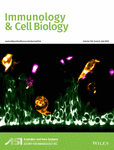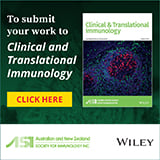Journal list menu
Export Citations
Download PDFs
Original Article
Lower expression of GATA3 and T-bet correlates with downregulated IL-10 in severe falciparum malaria
- First Published: 06 November 2015
The distinction between severe malaria and uncomplicated malaria has been linked to different levels of two gene-regulating proteins. The proteins GATA3 and T-bet are “transcription factors” which bind to DNA and control the activity of specific genes. These host proteins are known to regulate the production of interleukin-10 (IL-10), an anti-inflammatory protein produced in response to infections. Shashi Baruah and Anusree Mahanta at Tezpur University in India previously found lower levels of IL-10 in severe malaria. They therefore looked for a direct link between GATA3, T-bet and IL-10 in patients with severe malaria and uncomplicated malaria. Their results suggest that the Plasmodium falciparum microorganism that causes malaria actively depresses levels of GATA3 and T-bet in the severe form of the disease. Probing the mechanism of this effect might suggest therapies to reduce the resulting inflammation.
Profiling of primary peripheral blood- and monocyte-derived dendritic cells using monoclonal antibodies from the HLDA10 Workshop in Wollongong, Australia
- First Published: 13 November 2015
A diverse arsenal of antibodies reveals protein markers for various kinds of immune cells, and hints at yet unidentified cellular subtypes. Immunologists have identified three major subtypes of dendritic cells, which help ‘train’ the body's immune system to recognize both friend and foe. Researchers led by Stella Autenrieth and Hans-Jörg Bühring of the University Clinic of Tübingen, Germany, have tested a collection of antibodies against diverse cell surface proteins in order to identify which proteins are found on the different dendritic cell subtypes. Their results were generally consistent with prior findings, although the quality of the individual antibodies varied. They also identified at least one marker for which the dendritic cell expression pattern was notably different than expected. Interestingly, three antibodies also generated highly variable labeling patterns within individual dendritic cell subtypes, indicating that these categories may conceal unexpected heterogeneity.
Development of synthetic anti-cyclic citrullinated peptide antibody and its arthritogenic role
- First Published: 27 November 2015
Antibodies against modified proteins appear to play a role in rheumatoid arthritis, an autoimmune disease. Citrullinated proteins, in which the amino acid arginine is converted into citrulline, occur in most joints affected by rheumatoid arthritis. Antibodies against these proteins are also found in the joints, but it is not known if these antibodies are a cause or a result of the disease. To clarify this issue, Ji Hyeon Ju and co-workers at the Catholic University of Korea generated a synthetic antibody against citrullinated proteins and injected it into a mouse model of rheumatoid arthritis. While probably unable to induce arthritis on its own, the antibody was able to exacerbate the pre-existing arthritis in the mice. Therapies that interfere with the antibodies directed against citrullinated proteins might offer a promising new approach to managing rheumatoid arthritis.









